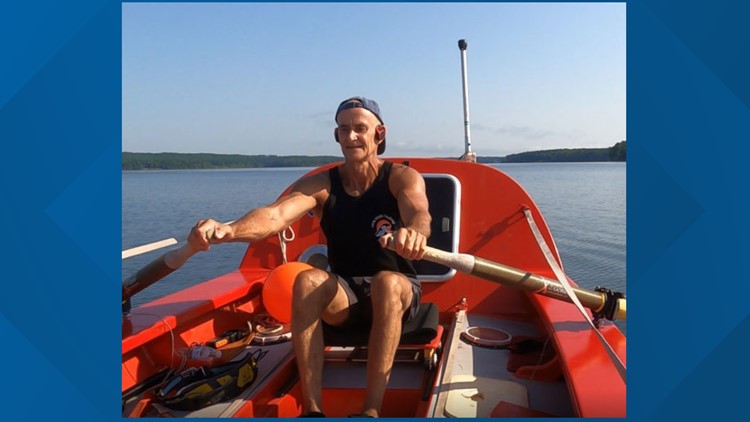VIRGINIA BEACH, Va. — Peter Harley has roughly 2.1 million oar strokes ahead of him. That amounts to 4,000 miles on the open ocean — or about 3-4 months of paddling the Atlantic.
The 61-year-old South Africa native, who resides in Cary, North Carolina, will embark this week on a solo row from Virginia Beach to La Trinité Sur-Mer, France.
“It’s only been ever attempted twice. Both unsuccessful,” Harley said of the route from Hampton Roads. “So an enormously difficult, huge challenge, and which I was very happy with.”
Harley plans to set off from the Dockside Seafood and Fishing Center on the Lynnhaven Inlet sometime this week — when conditions are just right. He’s launching from Virginia Beach due to its proximity to the ocean.
With help from daughter Bonnie Evans, Harley’s expedition doubles as a fundraiser. Evans created a website and robust social media presence for the challenge, which aims to raise $750,000 for charities benefitting the planet, children, and animals. The charities include plastic pollution-focused 5 Gyres, the Pediatric Brain Tumor Foundation and Best Friends Animal Society.
The journey, Harley said, is a realization of a dream born five years ago while watching the Talisker Whisky Atlantic Challenge. Teams compete in what is described as the “world’s toughest row” race, spanning more than 3,000 miles from the Canary Islands to the Caribbean.
“Watching the program sort of sowed the seed, but it was still unrealistic from South Africa,” Harley said.
When Harley relocated to North Carolina in 2019, his ocean row aspirations became “semi-realistic.”
The next step was finding a boat. Harley found a used craft for sale in the United Kingdom and had it shipped to Florida by October 2020.
“That’s when the rubber hit the road and reality set in,” he said.
Harley’s home for the near future is a 24-foot rowing scull-cuddy cabin hybrid. The tricked-out contraption, named the “Wild Ride,” has twice journeyed the Atlantic, but never with just one person.
A deceptively spacious cabin on the stern will allow for short naps, and vacuum sealed meals stowed throughout the boat contribute to its weight of more than one ton. A desalinator makes salt water drinkable.
However comfortable the boat may be, Harley has no plans for leisure.
His days will be split between shifts of rowing and rest. After six roughly two-hour stretches of paddling, Harley will retreat to the cabin for a few hours of sleep.
“Rowing is anything from 10 to 16 hours (per day) just depending on how I feel,” Harley said.
In the face of daunting weather, such as ocean swells threatening capsize, the vessel is equipped to re-right itself. And a para-anchor — a parachute that deploys from the bow — can stabilize the boat in gusty winds.
Solar panel-powered equipment will allow Harley to get messages and share his location on a virtual live tracker. If in dire straits, Harley can sound an alarm — called an emergency position indicating radio beacon — that will alert rescuers.
“Then basically the whole world knows that I’m in trouble,” Harley said. “That is the last resort.”
Harley doesn’t intend for that to happen.
In one documented attempt to row from Virginia Beach to Europe in 1966, two British journalists were lost at sea in a 15-foot rowboat named the Puffin. The Virginian-Pilot reported at the time that the Puffin was recovered — without its passengers — about five months later, 600 miles southeast of Newfoundland.
“The boat that they used really wasn’t properly suited to what they were facing,” Harley said.
In another cross-Atlantic attempt in 2018, powerful winds cut short a Scottish radio broadcaster’s transatlantic row from Norfolk. He was rescued safely by a Dutch cargo ship at the request of the U.S. Coast Guard.
Harley is confident his more modern boat, designed specifically for a journey this length, is up to the task. The timing also should benefit Harley — the trip across the Atlantic comes as the open ocean is at its “most relaxed.”
The preparation has been intense: 28 months of training, the last 13 of which have been “24/7″ endurance conditioning, Harley said.
If successful, Harley will have turned 62 by the time he arrives overseas. The plan for when he touches down in France is a “big party,” Harley said with a laugh.
“I can’t predict what I’m going to feel like,” Harley said. “A sense of accomplishment, achievement. Relief maybe.”



